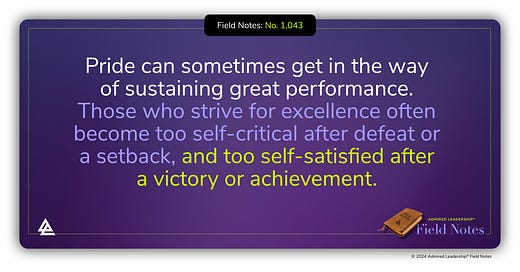Pride can sometimes get in the way of sustaining great performance.
Those who strive for excellence often become too self-critical after defeat or a setback, and too self-satisfied after a victory or achievement. Keeping the ego in check when things go well and poorly is a critical step in achieving the focus and discipline required for sustained success.
Legendary University of Tennessee basketball coach Pat Summitt knew that the distraction caused by over-celebration after victory and excessive mourning after defeat could cause her teams to lose the hyper-focus she desperately wanted to instill. So, she imposed a rule on herself and her team that all leaders should consider.
Known as the 24-hour rule, Summitt insisted that players limit their elation and lamentation to one day. After that, she claimed, it was vanity, pride, and ego that extended the flood of emotions and would derail the team if left unabated. If Coach Summitt saw any player focused on victory or defeat more than 24 hours later, she would insist they jettison the emotions and get back to work. This applied to the collective team, as well.
By limiting the time players or team members have to explore their emotions and thoughts after a critical contest or outcome, they learn to embrace the humility and concentration required to prepare for the next competition without much thought to the last one.
As experienced athletic coaches and corporate leaders will tell you, the idea of forgetting about the last shot, the last game or the last project is essential for performing at the highest level and sustaining that performance over time.
Team members want and deserve the time to work through the thoughts and emotions that come with success and setback. This is only natural and good leaders give them the space and time to learn from what just happened and to explore how this makes them feel.
But limiting that time in a reasonable way reminds team members to move on and not live or play in the past. A 24-hour period seems like a good standard. Use it for yourself and your team.





I wonder if there is the need for a longer window (>24 hours) in between seasons or projects - not to dwell on the past, but to take a mental break from it all.
Good morning,
I do not know Coach Summitt, but it sounds like she is practicing temperance. Good for her!
Another legendary coach is the late Bob Knight.
While the only second hand reports I have heard described him as a "hard man;* he certainly has made waves in his field. His records show he knew what he was doing (at least when it came to basketball). Something so rare these days is he got results consistently. He went so far as to write a book called THE POWER OF NEGATIVE THINKING. In this he discusses the power of focus, strategy, and grind. He emphasizes not getting caught up in the celebration. In reality we are all there to do a job. A few hours of celebrating, destroying the body, etc... takes away from recovery time and getting after it the next day.
Coach Knight was a controversial man, but I tend to agree with him and his wariness of developing optimism bias.
Personally, I do believe in celebrating the small wins and certainly the big ones. In the business world, I believe Jack Welch, PhD, said it best: "... placards and pay...," this is the right way to recognize successful members of your organization.
Thanks for your time.